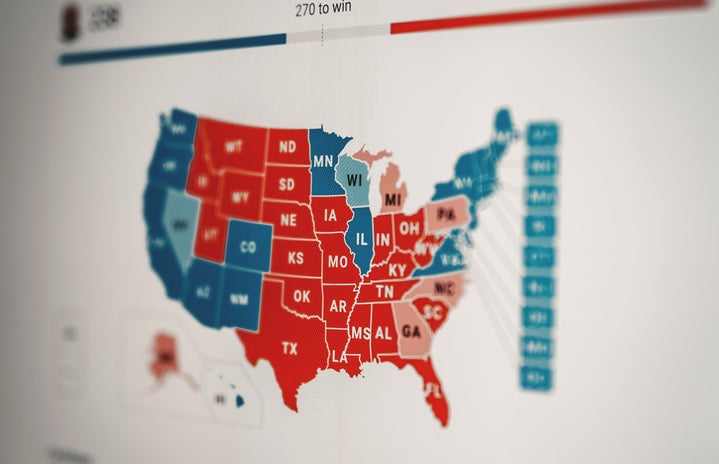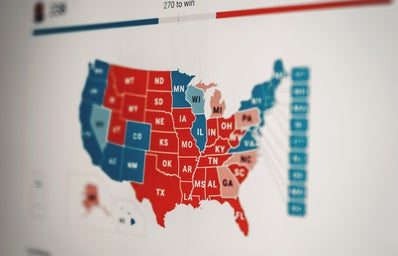On election night, students at Saint Louis University gathered in the Center for Global Citizenship, anxiously watching the electoral map shift on the big screen. Emotions were raw and unmistakable amongst students on campus. Most of the young voters present had cast their ballots for Kamala Harris, carrying hopes of change and progress — hopes that were threatened by each state that swung in the other direction.
Despite living in a predominantly red state, they had come together with a sense of shared purpose and cautious optimism. But as the night wore on and the results became clearer, a collective tension filled the room, as fears became realities.
“I voted for Kamala, and while she’s not perfect, it’s shocking to me that this election is close,” pre-med senior Kirti Madhu remarked sadly. “After January sixth, I thought it would be obvious which candidate would keep our democracy secure.”
For many, such as senior aerospace major Danielle Rogers, the stakes felt deeply personal. “I felt like my vote came down to a choice between democracy and the economy. Democracy wasn’t a risk I was willing to take.” Rogers put it bluntly, adding, “Women’s rights shouldn’t be something we have to vote on.”
Tensions were high on campus as many students from marginalized groups worried about what future may await them after the election. Many students expressed fears that one or more of their identities would be discriminated against under a second Trump administration.
Shelby Slomski, who has been out as nonbinary since 2021, said they felt “terrified.” With so much anti-trans legislation being pushed by the Trump administration, his victory is concerning for many gender-nonconforming individuals, whether they are actively seeking gender-affirming healthcare or not. “I don’t like these elections feeling like life or death,” Slomski sadly concluded as they refreshed the election map for the fourth time during our brief conversation.
Masters student Kaylee Gutzke, who proudly voted for Harris, said “I’m feeling terrified that I could lose my rights as a queer woman.” For many of us, this election determines much more than who will lead our country for the next four years. It determines the right to healthcare, workplace protections and rights against discrimination.
The chance to vote for a Black woman for president brought joy to many voters. Black students especially emphasized this historic moment and how powerful this representation was. Junior Curmyra Ross expressed her optimism about voting for Harris. “I feel very hopeful, and if she does win, it’ll be a very historical moment,” the health sciences major said.
Some voters appeared to be in high spirits. Speech-language pathology student Anthony Hospins said, “I am feeling very empowered right now. It’s the start of a new era, and I feel like when [Harris] gets elected, a lot of things are going to change for the better.”
Early on Tuesday, freshman pre-med student Jude Thomas, who voted for the first time in this election, shared that he was “confident that Kamala will win, but still nervous.” Those nerves turned out to be very well-founded.
Lily Furtkamp, a senior marketing major, shared the same combination of nerves and optimism, saying “I’m nauseous right now, but hopeful that this country values love, lives and law enough.”
As the night continued and results appeared more and more bleak, the stress only increased. “I’m literally having a mental breakdown right now,” said Lily Dang, a junior who is currently studying abroad. “Full-blown panic attack.”
As the hour grew late and the watch party wound down, students were left with heavy hearts and lingering anxieties. For many, the lack of a definitive result felt almost as difficult as a loss, leaving them to face a night of uncertainty and restlessness.
Their fears about what a second Trump term might mean for democracy, personal freedoms and the rights of marginalized groups remained as pressing as ever, and the next morning when election results were announced, all of those worst fears came true.
The re-election of Donald Trump left the country in a state of uncertainty, with millions questioning the future of American democracy and civil liberties. People from all walks of life expressed concern, especially marginalized communities who feared the potential rollback of hard-won rights and protections.
I woke up in tears on Nov 6. The results left me shell-shocked and distraught. Scared for the future of my home country, Ukraine and Trump’s promise to “end the war in 24 hours,” scared for women all across America facing harsh reproductive restrictions and scared for people of color. I am scared for everyone in America who is not a white, cisgender man.
Social media was flooded with reactions — shock, sadness and resolve to continue advocating for justice, despite the apparent setbacks. For many, the results were not merely political; they signaled a deeper cultural shift that some found difficult to reconcile with their vision of an inclusive, democratic society.
Despite America being seen as a beacon of hope across the world, we live in a society where so many people experience intense fear and anxiety about election results. For so many women, people of color, immigrants and members of the LGBTQ+ community, the result of this election filled us with dread and disappointment. No one should have to face an uncertain future in a country they call home, yet for countless Americans, the election underscored how fragile their rights and freedoms remain.


